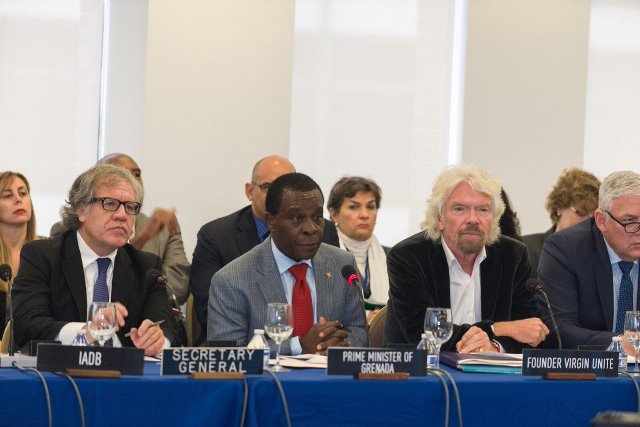
WASHINGTON, USA, October 15th 2017 – There is no official word from Basseterre, why St. Kitts and Nevis’ Prime Minister and Minister of Finance, Dr. Timothy Harris was not among finance ministers from Latin America and the Caribbean and senior officials from the Inter-American Development Bank (IDB), the International Monetary Fund (IMF), the World Bank (WB) and the US Treasury Department at a meeting last Wednesday at the IDB’s headquarters to discuss policy options to promote inclusive financial systems and deeper regional integration to help strengthen economic growth prospects.
Prime Minister Harris was also absent from several other very important meetings including the Caribbean Partners Dialogue on Hurricanes with the Organisation of American States (OAS); the World Bank-CARICOM meeting, the Small States Forum chaired by the Prime Minister of Grenada, Dr. the Right Hon. Keith Mitchell and CARICOM and the Virgin Group led by Sir Richard Bronson at which hurricane recovery was discussed; ; sent from several
Latin America and the Caribbean is expected to post 1.0 percent growth this year, accelerating to 1.9 percent in 2018. However, the region’s growth potential has dropped to 2.5 percent from an estimated 4.1 percent in 2012.
Argentina’s finance minister Luis Andrés Caputo opened the meeting, attended by representatives from 25 countries. Opening session speakers included IDB president Luis Alberto Moreno, IMF deputy managing director Mitsuhiro Furusawa, World Bank vice president Jorge Familiar, and the US under secretary of the Treasury David Malpass.
“This is an historic opportunity to consolidate our population’s progress and to continue to reduce poverty,” Caputo said. “For this, we need to achieve greater and better-quality growth. As finance ministers, it is our responsibility to create the suitable financial conditions to make capital flow into infrastructure projects and other ventures so our economies become more competitive. Only then will our position in world trade and economic matters improve. This is the basis for the prosperity of our citizens.”
“Fostering sustainable economic growth is the greatest challenge of our time,” Moreno said. “With the disappearance of the demographic bonus and the exhaustion of the commodities boom, we would need to double investment or productivity growth if we are to grow at rates that are competitive with those of Asia. For this, nations in our region need to foster individual policies and collectively leverage the potential of regional integration and of technological progress.”
The area responded to the international financial crisis by implementing fiscal policies that favoured current expenditure and had a positive effect on poverty, but otherwise contributed little to raise real and potential growth.
The region’s ministers agreed on the need to improve the efficiency of expenditure at national level, boost investment in strategic areas such as infrastructure and education, and foster financial inclusion, with a particular focus on gender perspective.
They also underscored the opportunities for regional cooperation to promote platforms that help reduce financing costs, foster deeper trade integration, and implement collective initiatives oriented at taking advantage of the new technologies.
The ninth meeting of finance ministers of the Americas and the Caribbean – also known by its acronym RFM – was chaired by Caputo. Authorities from the Development Bank of Latin America (CAF) and from the Economic Commission for Latin America and the Caribbean (ECLAC) also participated in the event.
The RFM is an annual dialogue which aims at discussing issues of strategic relevance that have the potential to promote that integration and regional cooperation.
The IDB serves as its technical secretariat, assisting with the preparation and general coordination of RFM meetings.






























